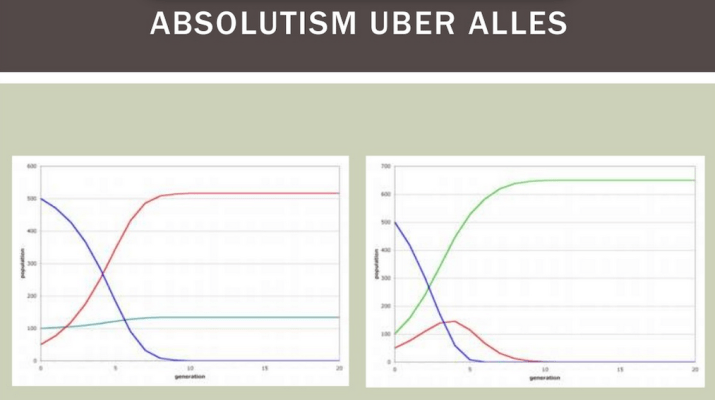The Internet has become the world’s Sorting Hat: it identifies, and increasingly defines, the subculture(s) to which people belong. Does your Facebook feed feature Mother Jones or Fox News? The Guardian or The Telegraph? GamerGate vs Social Justice Warriors. Civil libertarians vs. terror-thumping authoritarians. r/parenting vs. r/childfree. Second Life vs. Digital Detox.
Such distinctions existed before the Internet, of course; but they’re far sharper, and far more numerous, today. To quote Balaji Srinivasan of Andreessen Horowitz:
An infinity of subcultures outside the mainstream now blossoms on the Internet — vegans, body modifiers, CrossFitters, Wiccans, DIYers, Pinners, and support groups of all forms. Millions of people are finding their true peers in the cloud.
I’ve argued before that: “There is no such thing as majority mainstream culture any more. We are all weirdos now — thanks to tech.” Instead, the Internet is fragmenting our society into constellations and galaxies of social bubbles. Many are compatible with one another–one can be both a CrossFitter and a DIYer–but many others are mutually exclusive and/or competitive.
This is mostly a good thing. Once, government and media gatekeepers could define both “mainstream culture” and its acceptable language of discourse; now, people can, rightly, ignore that kind of attempt to impose the values of the elite onto all of society.
However. It’s OK to live in a bubble; but it’s not OK to not know that you live in a bubble, and/or to be unable to communicate with the rest of the world. However awful and repressive “mainstream culture” may have been, it at least provided a common context for communication. In the world of the Great Fragmentation, this inability to talk to to people who don’t share your bubble’s assumptions is a growing — albeit often hilarious — problem.
I give you this pearl of an example: the Reddit AMA of FCC Commissioner Mignon Clyburn, whose government-bureaucrat-bubble language so infuriated Redditors that they downvoted all of Clyburn’s answers into oblivion, and birthed this superbly scathing comment:
This AMA looks to me like a political stunt to say something along the lines of, “Yeah, I went on that interweb thing and talked to the American people! We had discussions about everything from Net Neutrality to Eminem!” … Your answer, which really fell flat in terms of answering the original question, was packed with buzz-words and fluff … You’re working on making sound policies over a period of time? Excuse my french, but NO SHIT. That’s not what that guy asked. That’s not what the internet asked.
Consider also this excellent blog post from Fredrik deBoer, regarding:
the default code of today’s online social progressives, which I like to call We Are All Already Decided. This is the form of argument that takes as its presumption that all good and decent people are already agreed on the issue in question … They have no ability at all to express themselves to those who are not already in their tribe. They say terms like “privilege” or “mansplain” or “tone policing” and expect the conversation to somehow just stop, that if you say the magic words, you have won that round and the world is supposed to roll over to what you want.
(Read the whole thing, it’s terrific.)
So: either our fragmenting subcultures will get better at speaking to those who don’t share the same assumptions, or the inability to do so will amplify and accelerate that fragmentation, and we’ll wind up with a society made of bubbles that don’t understand, trust, or communicate with one another. (Any resemblance to the political culture in today’s America is probably not coincidental.)
Which puts me in mind of Meredith Patterson‘s talk “Strategies Without Frontiers“–also strongly recommended–which is (in part) about Toby Ord‘s work on the “societal iterated prisoner’s dilemma.” (PDF)
To oversimplify, this work takes the classic Prisoner’s Dilemma and expands it to a society of many participants, each with different strategies, who are aware of each other’s actions. Imagine each participant as a subculture, and one can at least envision an (enormously complex) expansion of this approach into “social simulations” to determine the most likely outcomes of the interactions between subcultures.
If so, let’s hope that the emergent properties of larger, more complex systems are very different from Ord’s simplified model. Because in many of its simulations, Absolutists — those who reject all others who do not subscribe to their purity — eventually take over the world. (Mind you, “Absolutist is only really a tenable strategy when there is no noise in the players’ information or actions. If there is a small chance of error in information or action, then Absolutists end up defecting on each other and can never break out of this.”)
I readily concede that this is all exceedingly handwavey. Moreover, Ord explicitly specifies that his work is “a good model for small populations,” not necessarily applicable to larger societies. But the notion that the fragmentation of our society into well-defined subcultures could lead to it being meaningfully modelled and simulated on a large scale is too appealing to ignore. Never mind Hari Seldon: maybe Big Data can bring us Foundation.
